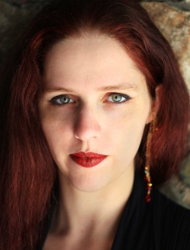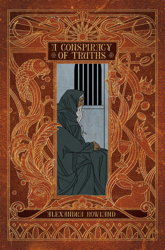
In theory, as you’re reading this, I should be safely back from Detroit, deliriously exhausted from a long weekend with friends and colleagues, and smug that I did not over-indulge while away. If I’m in a particularly righteous mood, it no doubt means that I had the discipline to slip away from the festivities each day and write for a couple of hours. But of course, all that awaits me in my future because I’m setting this up to post a week or so in advance, because I’m pretty sure I’ll be too busy during the convention to even remember to do so otherwise
For the current work-in-progress, I’ve been writing a chapter involving magic drawn from the elemental plane of existence, specifically water elementals. That’s as much as a segue as I can muster to introduce this week’s EATING AUTHORS guest, Alexandra Rowland, who though she currently resides in western Massachusetts grew up on a sailboat in the Bahamas. As a life-long land lubber, reading that sentence fills my brain with endless questions about common events of childhood that I’m sure I took for granted at the time. Unfortunately for me, I’m only permitted to ask a single question of guests here, and we all know what it is.
Alexandra’s most recent novel, A Conspiracy of Truths, features a storyteller protagonist. That alone was enough to hook me. But then she went and added some conflict (because most of you like your books to have, you know, a plot). So, naturally enough, the storyteller is arrested for that classic one-two punch of being both a witch and a spy. I’d tell you more, but I want you to go and buy the book yourself.

LMS: Welcome, Alexandra. What’s been your most memorable meal?
AR: At the beginning of 2014, my father died–terminal lung cancer. We’d only caught it about two months before. Within two weeks of first hearing the diagnosis, I quit my job in St Louis and had moved back home to Florida, where I told my obviously distraught mother in no uncertain terms that when the worst happened, I was going to force her out of the house to have an adventure. We spent five months in Europe, from May to September.
A month or so into the journey, our paths diverged—she went to Italy to visit a friend, and I headed up into Scandinavia. I landed in Oslo very late at night (though it was far enough into summer that the sky at midnight was little darker than twilight), only to discover that the last bus to the hotel had left half an hour previously. “Well, shit,†I thought.
It was the first time I was ever alone in a foreign country.
To be fair, though, a no-darker-than-twilight night in Oslo is a pretty safe place for a female-presenting English speaker to be alone. It’s an interesting thing, aloneness—no one to tell you what to do, no one to help you, but also no expectations and no one to please or consider but yourself.
I spent almost all my cash on a taxi to the hotel, which, I discovered when I arrived at half-past midnight, was in a series of buildings that appeared to be like nothing so much as a renovated military barracks, surrounded by thick Norwegian forest. When I went to check in, the attendant told me they didn’t have my reservation in the system.
After a tedious process which I am sure you can imagine well enough that I need not explain, the reservation was found. The room I was given was tiny, the bathroom miniscule, but it was clean and the narrow, lumpy twin bed was sufficient for my purposes. I woke up again at sunrise—which was at 4am—and, blearily cursing the whole idea of latitude and discovering that the window did not have blinds, did what I could to drape a blanket across it to block out the light and get a couple more hours of rest.
At a more civilized hour of the morning, I discovered there was no hotel breakfast, nor a convenience store. I briefly entertained the idea of entering the forest behind the so-called “hotel†to become a hunter-gatherer, because the bus to the city would take nearly an hour and I was already starving. I hunted-and-gathered half of a stale, forgotten cookie from the bottom of my purse and reflected upon some of my life choices while I waited at the bus stop with the forest at my back. In the city, I couldn’t find an ATM, so I spent the last of my cash on fruit and snacks and a couple microwaveable packets of soup. I saw what sights I could, walked until my feet were ready to fall off, braced myself for the highway-robbery credit card fees to buy a ticket to a museum.
The bus back to the hotel was delayed, and when I finally got there again, footsore and very tired and once again starving, I discovered that I could not, in fact, microwave the packets of soup, as there was no microwave. Not in the room, and not at the desk. I briefly considered having a short, therapeutic cry.
But that’s the thing about aloneness—no one to please but yourself, and no one to annoy but yourself. If I’d been with anyone else, all the little inconveniences of the trip might have built up. We would have expressed our frustration to each other, building it up together into something twice as bad as it really was. We might have started thinking that this leg of the trip was unpleasant, even catastrophic. We might have even argued.
But there was no one else. Just me, frustrated and starving and alone, making choices about inconveniently located hotels and misremembering the appliances present in the room, and dealing with each new thing as it arose and bearing the consequences of my choices by myself, because there was nothing else to do but solve the problem in front of me: The taxi had to be paid for, the window had to be covered, the bus took the time that it took, the credit card fees were what they were.
And at the end of a long day, I could slurp cold, congealed soup directly out of a packet (no spoon, no bowl or cup), or I could be creative. I could fix things for myself too. No one else was going to.
I filled the tiny sink in the tiny bathroom with scalding hot water and let the soup packet float in it until it was warm, and then I ate it, sitting in the middle of the floor (no chair or table). I noticed then that the room was floored with these silvery pine boards that were, actually, remarkably beautiful. I noticed too that with the window flung open, I could catch the deep, ancient smell of the forest. The sun was warm, the breeze comfortably cool. And even slurped out of the packet, that soup was delicious.

Thanks, Alexandra. At first, I thought you were describing Franz Kafka’s most memorable meal, and then, as if by an act of will, the magic came out. Of course, being alone, no one else was there to share in it, until now.
Next Monday: Another author and another meal!
Want to never miss an installment of EATING AUTHORS?
Click this link and sign up for a weekly email to bring you here as soon as they post.
#SFWApro
Tags: Eating Authors


